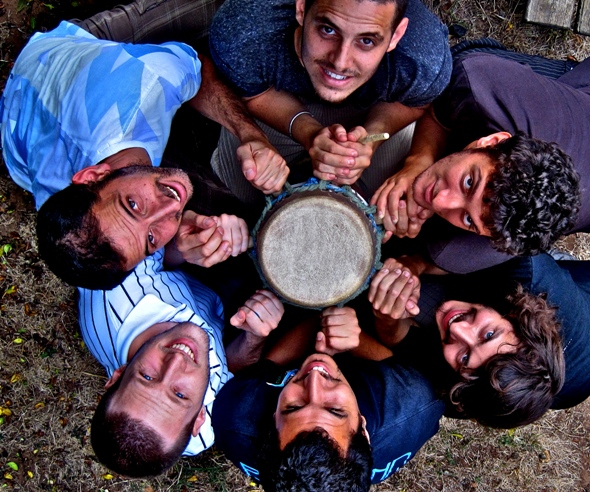
Hebrew Jazz, the new concert series to open at Beit Avi Chai on Monday, November 14, 2011, is an exciting encounter between contemporary Israeli jazz musicians and the canonic Hebrew songbook. Exploring the different musical and cultural narratives of Hebrew song – Naomi Shemer, the writing partnership of Ehud Manor and Matti Caspi, Mizrahi music, Jonathan Geffen’s The Sixteenth Sheep, Hassidic music – with new arrangements that reflect the sensibility and diverse influences of Israeli jazz musicians today.
Artistic Director Barak Weiss, Artistic Director of the Tel Aviv Jazz Festival and Director of the International Exposure for Jazz and World Music, says that “Israeli jazz is flourishing, with many Israeli musicians an integral part of the international jazz scene.” Weiss pointed out that many Israelis travel abroad to develop their music, often to the US, working, writing and performing in both countries, creating an ongoing dialogue between the local and international scene that has brought new energy and new audiences to Israeli jazz. Weiss feels that Israeli jazz has come into its own and “come of age,” with a renewed interest in Hebrew song and sources as one of the strong signs of this maturation. “The merging of Jewish cultural influences from different Diasporas with Hebrew song and the African origins of jazz creates a unique identity, giving deep resonance to the concept of Israeli jazz.”
Performances in the Hebrew Jazz series present new interpretations to works from significant chapters in the history of Hebrew song, along with original compositions influenced by the latter. Opening the series on November 14, 2011 at 21:00 will be the Black Guru Sextet performing songs of the Gesher Hayarkon Trio with special guest Alon Olearchik. Black Guru was founded in 2010 by long time friends Ben Aylon and Yair Hashachar, whose love for African music took them to Gambia (including a brief sojourn in a Gambian jail) and Senegal to study the songs of the Mandinka and Wolof tribes. The five member group includes: Ben Aylon, African drums (Guinea, Senegal, Gambia, and Mali); Yair Hashachar, guitar and percussion; Yehonatan Cohen, soprano saxophone and percussion; Itamar Shatz, tenor saxophone and percussion; Yoav Eshed, guitar and percussion; and Guy Levy, bass and percussion. Including among their influences musicians such as Fela Kuti, Bassekou Kouyate, Toumani Diabate, Tinariwen, and Ali Farka Toure, the performance at Beit Avi Chai will bring them together with the music of an Israeli legendary super-group: The Gesher Hayarkon Trio.
Active from 1964 to 1966, each of the individual musicians who took part in Gesher Hayarkon has an important place in the history of Israeli music. Arik Einstein, Benny Amdursky and Yehoram Gaon were the trio’s first edition, with Israel Gurion replacing Yehoram Gaon by their second album. Gesher Hayarkon was known for songs by Israeli composers as well as their covers of songs by international groups, most of their songs were arranged by Itzhak Graziani. Black Guru will perform covers of: Eyzeh Yom Yafe, a cover of Bob Gibson and Bob Camp’s You Can Tell the World translated by Haim Hefer; Tzrif Yashan, lyrics: Haim Hefer, music: Yohanan Zarai; Hamsin, lyrics: Haim Hefer, music: Yohanan Zarai; and Im Rak Tavo’I Behamesh, lyrics: Amos Ettinger, music: Yonahan Zarai.
Black Guru told Midnight East that they had been listening to the Gesher Hayarkon Trio since high school. Yair’s mother had a CD collection in the family car, and Yair and Ben ended up listening to the CD while driving, half in fun, with a retro wink, but with a real love of the songs. The connection between their own African influenced music is not an obvious one, but they hope it will reveal new perspectives on both the Hebrew and the African songs. In one of their numbers, they plan to merge the song Tzrif Yashan with an African song Massane Tisse, whose origins are in the Mandika tribe. While Gesher Hayarkon are noted for their harmonies, and African music is usually admired for its rhythms, through their music Black Guru aims to acquaint audiences with the melodic nuances found in African music.
Black Guru is currently in rehearsals for the concert, this clip gives a sense of where they’re going with their version of Ezeh Yom Yafe, Haim Hefer’s translation of Bob Gibson and Bob Camp’s You Can Tell The World:
This really is a song that has travelled far and wide. This is the Gesher Hayarkon Trio’s version:
And this is Simon and Garfunkel:
Concerts in the series will take place on Monday nights at 21:00 in room P7 at Beit Avi Chai, 44 King George Street, Jerusalem, 02-621-5900. Admission: NIS 50; students: NIS 30 (first drink on the house). Four tickets: NIS 170 (instead of 200). Limit two tickets per concert.
Future concerts include:
November 28 Uri Bracha Trio—Songs from “Beautiful Tropical Land” and Israeli Bossa Nova. This concert is based on “Beautiful Tropical Land” (1977) by the late Ehud Manor and Matti Caspi, which opened the door for Brazilian songs in translation and the bossa nova to penetrate Israeli culture.
Original jazz arrangements with the main sources of Bracha’s inspiration—top Israeli guitar musicians and teachers, music by Matti Caspi and composer Jobim. Uri Bracha, classical and electric guitars, vocals; Eyal Ganor, contrabass; Roy Uliel, drums and percussion
December 12 Avi Adrian Trio—Songs from the Hassidic Song Festival and other Hassidic Melodies. Veteran pianist Avi Adrian in jazz adaptations of famous songs sung at the Hassidic Song Festivals from 1969 to 1976 and other melodies from the Hassidic traditions of Modzhitz, Habad, and Braslav. Avi Adrian, piano; Roni Holan, drums; Arie Volinez, bass.
December 26 Matan Klein Sextet—Naomi Shemer’s Songs. Clarinetist, composer, and arranger Matan Klein, who returned to Israel after many years in New York, in a tribute to the “High Priestess” of Hebrew song, Naomi Shemer. New interpretations of familiar melodies, incorporating jazz and music styles from around the world. Ella Tadmor, vocals; Matan Klein, clarinet, musical arrangements; Gabi Lapid, guitar; Yoav Polachek, piano, keyboard; Avri Borochov, bass; Ilan Tsamir, drums.
January 9 Ronen Shmueli Quintet—in the Footsteps of the Pioneers of Mizrahi Music.
January 23 New Orleans Function Sextet—Cabaret Music from Little Tel Aviv
February 6 Trio Millionaires—Ha-Keves Ha-shisha Asar.
February 27 Yuval Cohen Sextet, songs of David Zahavi.





